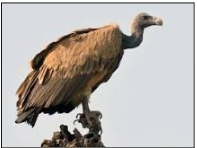GS Paper - 3
Why in the news?
- A vulture restaurant has recently been inaugurated in the Koderma district of Jharkhand.
- It aims to actively participate in the conservation efforts to safeguard the dwindling vulture population.

About Vulture
- Vultures are medium to large scavenging birds
- It is found predominantly in tropical and sub-tropical regions.
- They have heavy, dull brown or black bodies with hunched-over stances and shaggier feathers.
- Bald heads and throats serve a thermoregulatory function.
- Broad wings enable them to soar in search of prey.
- There are 23 extant species of vulture.
Food Preferences and Ecological Role:
- Vultures primarily consume carrion, garbage, and occasionally excrement, rarely preying on live animals.
- Their scavenging behavior helps control the spread of diseases, including fatal ones among humans.
Conservation Status:
- Critically endangered according to the IUCN Red List.
- Listed on Appendix II of CITES.
- Schedule I protection under the Wildlife Protection Act, 1972, for Bearded, Long-billed, Slender-billed, and Oriental white-backed vultures.
- Himalayan, Red-headed, Egyptian, Cinereous, and Eurasian Griffon are under Schedule IV.
Threats Faced:
- Poisoning, particularly from toxic non-steroidal anti-inflammatory drugs like diclofenac, leading to kidney failure.
- Electrocution and collisions with high-tension power lines and vehicles.
- Persecution by communities due to their scavenging nature, resulting in deliberate poisoning or hunting.
- Forest fires destroying traditional nesting sites and reducing vulture populations.
- Starvation due to the scarcity of preferred food sources.
Vultures in Jharkhand
- Vulture sightings in Koderma district have surged since 2019 after a two-decade absence.
- A 2023 survey recorded 145 vultures, marking a significant rise from the 38 observed in 2022.
- The Jharkhand coordinator for the Indian Bird Conservation Network reported a recent population increase of around 450-500 vultures in the state, encompassing six different species.
- Egyptian vultures have been spotted in the Hazaribag Wildlife Sanctuary in Jharkhand.
Recent Conservation Initiative
- A recent establishment known as the "Vulture Restaurant" is located in Gumo under Telaiya Nagar Parishad in Koderma district.
- The primary aim of the restaurant is to generate awareness about the dwindling vulture population and the various threats faced by this species.
- The site is designated as a feeding ground specifically for vultures.
- However, the restaurant is currently awaiting the finalization of protocols for diclofenac-free carcasses from goshalas and municipalities.
Government steps for vulture conservation
- Ban on Harmful Drugs:
- In July 2023, the Union Ministry of Health and Family Welfare prohibited the manufacturing, sale, and distribution of ketoprofen and aceclofenac, along with their formulations for animal use.
- This action was taken under section 26A of the Drugs and Cosmetics Act, 1940, as these drugs posed a threat to vultures.
- Impact of Aceclofenac and Ketoprofen:
- Aceclofenac, when used in animals, rapidly transforms into diclofenac and lingers in the body for extended periods.
- Ketoprofen, an anti-inflammatory NSAID, proved poisonous to the Himalayan vulture.
- Vulture Action Plan 2020-25:
- Launched by the Ministry of Environment, Forests, and Climate Change, the plan focuses on minimizing diclofenac usage and preventing the poisoning of cattle carcasses with veterinary NSAIDs.
- Safety testing of NSAIDs on vultures, development of vulture-friendly alternatives, and automatic removal of toxic drugs from veterinary use are key objectives.
- Implementation of the Vulture Safe Zone program, regular vulture population censuses, and the creation of a comprehensive threat database are integral to the plan.
- Establishment of additional Conservation Breeding Centers and Vulture Conservation Centers.
- Jharkhand Forest Department Initiatives:
- The Jharkhand Forest Department is committed to establishing a vulture interpretation and rescue center.
- Geo-tagging of vultures will be implemented to monitor and track their movements.
- A 100-km radius around Hazaribag has been designated as a vulture safe zone.
These measures collectively aim to safeguard vulture populations, curb the use of harmful drugs, and promote conservation efforts across India.
Conclusion
The creation of a "Vulture Restaurant" in Koderma stands as a commendable initiative aimed at increasing awareness regarding the challenges confronting the vulture population.



